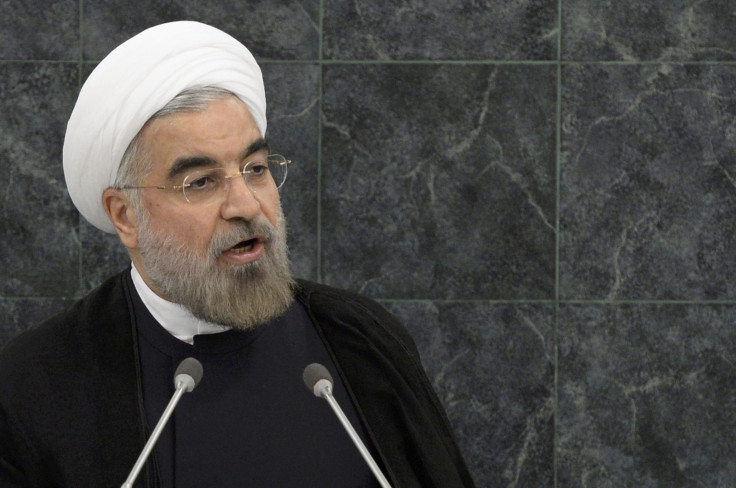Rouhani’s Charm Offensive Already Paying Off For Tehran

Iranian President Hassan Rouhani’s charm offensive has already changed the global dynamics over Iran’s nuclear pursuit to Tehran’s advantage, with the West easing its pressure and Israel now positioned as a stubborn outlier.
Also to Tehran’s benefit, Rouhani’s efforts have opened a clearer fissure between Washington and Jerusalem. Not only is U.S. President Barack Obama clearly banking on diplomatic success while a skeptical Israeli Prime Minister Benjamin Netanyahu reiterates his threats of an Israeli military strike, but Obama also seems more likely to take a deal with Tehran that Netanyahu would find hard to swallow.
Beneath the search for a diplomatic holy grail that would satisfy everyone, the latest maneuvering in Tehran, Washington, Jerusalem and elsewhere begs a fundamental question: Is a real, verifiable, enforceable deal with Iran more likely to result from more economic pressure or less?
That is, should the West maintain, if not tighten, its sanctions because they are what prompted Rouhani’s outreach, or should it reward Rouhani’s opening by delaying more sanctions if not easing the existing ones?
Iran’s determined march to nuclear weaponry, along with the ever-more apparent impact of sanctions on Iran’s economy, suggests that only a further economic tightening that threatens the regime’s grip on power can convince Tehran to meet the West’s demands on enrichment, stockpiles, facilities and transparency.
If so, recent developments in the ever-hopeful United States and across the ever-gullible West are troubling indeed.
That sanctions are increasingly hurting Iran’s economy and impairing living standards is beyond dispute. The rial has plummeted, inflation has skyrocketed, goods are scarce and sanctions on oil exports have severely limited state oil revenues, making it much harder for the government to fund its budget.
Tehran is so strapped for cash, Reuters reports, that it’s “preparing a politically risky increase in domestic fuel prices” by, for the second time in three years, reducing government subsidies that hold down consumer fuel prices.
After cutting subsidies in December 2010, Tehran decided not to do so again last year because living standards were already falling. That it may do so now shows how desperate the cash-starved regime is getting.
But, just as sanctions are working better than skeptics had predicted – prompting Rouhani to promise sanctions relief when he ran for president and to pursue it after his victory – the West is starting to ease its pressure.
In light of Obama’s chat with Rouhani, in which the two pledged to seek a diplomatic solution to the nuclear issue, the Senate Banking Committee delayed action on proposed new, House-passed sanctions. Administration officials sought the delay so that new sanctions don’t complicate the U.S.-Iranian talks.
Western governments, meanwhile, are considering whether to ease their longstanding demand that Tehran stop all uranium enriching and rid itself of all enriched uranium. “I believe,” Lithuanian Foreign Minister Linas Linkevicius told Reuters, “part of the game is that if the Iranians prove that whatever they are doing is peaceful, it will, as I understand it, be possible for them to conduct it.”
The West’s renewed desire for negotiations, and its eagerness to interpret Iranian desires in a positive light, is what lay behind Netanyahu’s tough speech about Iran this week at the United Nations.
Israel’s leader, who has worked relentlessly in recent years to ensure that Iran’s nuclear program remains a top-tier global concern, reviewed the long history of Iranian perfidy and progress. He specified Iran’s threats to eliminate the Jewish state, its boasts of advancing its nuclear program while supposedly negotiating in good faith, its growing stockpile of enriched uranium that could be converted to weapons-grade levels, and its acquisition of more advanced centrifuges that could speed enrichment.
Nevertheless, Israel now finds itself more isolated than ever on Iran.
Whereas the West would delay more sanctions and offer concessions before Tehran has offered anything of note toward dismantling its program, Jerusalem would tighten the screws to force the issue with Tehran.
Whereas Jerusalem insists that it will strike militarily if the need arises even if it’s alone, Rouhani’s charm offensive and the U.S.-Iranian talks that it spurred surely complicate matters for the Jewish state.
As if to illustrate the U.S.-Israeli split, the Obama-backing New York Times chastised Netanyahu for his “sarcasm” and “combative words,” saying it would be “disastrous” if he and his congressional allies “were so blinded by distrust of Iran that they exaggerate the threat, block President Obama from taking advantage of new diplomatic openings and sabotage the best chance to establish a new relationship since the 1979 Iranian revolution sent American-Iranian relations into the deep freeze.”
Well, that’s one way of looking at things.
Lawrence J. Haas, former communications director for Vice President Al Gore, is a senior fellow at the American Foreign Policy Council and author of “Sound the Trumpet: The United States and Human Rights Promotion.” Follow him on Twitter @larryhaasonline.
© Copyright IBTimes 2024. All rights reserved.





















